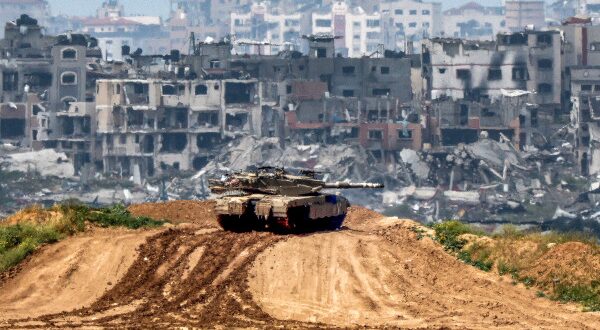As the Syrian conflict continues to unfold, various developments have emerged in recent weeks. A top Iranian military adviser has died from injuries sustained in a recent airstrike in Syria, while Syrian refugees in Gaza struggle to survive amidst the ongoing Israeli-Palestinian conflict. Meanwhile, Turkey and Syria are navigating a delicate diplomatic dance, with complex geopolitical influences and uncertainties at play. Additionally, a Pakistani organization is building a settlement in Syria’s Afrin region, raising concerns about land ownership, displacement, and environmental impact. These stories highlight the complex and ever-changing landscape of the Syrian conflict, with multiple actors and interests at play.
Iranian military adviser dies following injuries in Syria
A military adviser from Iran’s Revolutionary Guard’s Aerospace Force has died following injuries sustained in Syria over recent weeks, the semi-official Fars news agency reported on Thursday and cited by Reuters.
“Colonel Ahmadreza Afshari was martyred due to injuries sustained from aerial bombardment from the coalition violating Syria,” top Revolutionary Guard Commander Hossein Salami said.
Iranian media did not give a precise date for the strike but said Afshari sustained his injuries between late July and early August.
The U.S. and Israel have both carried out strikes in Syria against Iran-aligned factions, where Tehran’s influence has grown since it began supporting President Bashar al-Assad in a civil war that started in 2011.
How are Syrian refugees in Gaza coping with Israel’s genocidal war?
New Arab published a report that tells the story of Syrian refugees who fled to Gaza seeking safety, only to find themselves struggling to survive amidst the ongoing Israeli-Palestinian conflict, with many now appealing for international help to relocate.
Only nine Syrian refugee families remain in Gaza, out of 36 who arrived in 2015. Anas Qatirji, a 37-year-old Syrian refugee, fled Aleppo in 2013 and crossed into Gaza via a smuggling tunnel. He found acceptance in the community and built a new life, opening a restaurant in 2016. However, the recent Israeli war has left him displaced and without hope.
Qatirji’s story is not unique. Dana Shurab, a 40-year-old Syrian refugee, also fled Aleppo in 2013 and arrived in Gaza through the smuggling tunnels. She has lost everything in the recent war and appeals for help to leave Gaza, which she describes as “a place where life does not resemble life.”
Both Qatirji and Shurab are unable to leave Gaza due to their illegal entry and lack of official documents. They appeal to the international community, particularly the UNHCR, to help relocate them from Gaza and possibly return to Syria.
The situation for Syrian refugees in Gaza is dire, with many struggling to survive amidst the ongoing Israeli war. Their stories highlight the need for urgent international attention and assistance to address the humanitarian crisis in Gaza.
Red lines and reconciliation: Turkey and Syria’s diplomatic gamble
Sinan Hatahet and Ömer Özkizilcik wrote a paper in The Atlantic on the evolving dynamics of Syria-Turkey relations, and the diplomatic efforts between the two countries to address their respective interests and concerns, including regional security, refugee returns, and political stability, amidst complex geopolitical influences and uncertainties.
The article provides an in-depth analysis of the evolving dynamics of Syria-Turkey relations, driven by regional security concerns, domestic political pressures, and the broader geopolitical landscape. Turkey’s primary objectives include addressing the YPG threat, facilitating refugee returns, and seeking political stability in Syria, while Syria aims to consolidate control over its future political landscape and achieve economic recovery through re-established trade links.
Turkey’s motivations for re-engaging with Syria are driven by regional security concerns, domestic political pressures, and the broader geopolitical landscape. Russia plays a significant role in influencing Turkey’s policy decisions and shaping perceptions. The United States’ refusal to abandon the YPG continues to be a barrier to reaching an agreement between Turkey and the US.
Russia’s strategy in Syria aims to prevent Western powers or their regional allies from establishing a solid position in Damascus. Damascus is wary of legitimizing Ankara’s military presence in its territory and insists on the complete withdrawal of Turkish Armed Forces from northern Syria as a prerequisite for reconciliation.
The path to reconciliation remains uncertain, with complex technical negotiations and deep-seated issues to be addressed. The article highlights the complex and delicate nature of Syria-Turkey relations, with both countries navigating a diplomatic gamble to address their respective interests and concerns. While recent developments suggest a thaw in relations, the road to reconciliation is fraught with uncertainty, and the real test lies ahead in forging a sustainable path forward amid enduring skepticism.
Pakistani Organization Builds Settlement in Syria’s Afrin Region
A Pakistani non-governmental organization, Faizan Global Relief Foundation (FGRF), in collaboration with Turkey’s Diyanet Foundation, is constructing a settlement in the Afrin region of northwestern Syria, North Press reported.
The settlement, named “al-Madina Village,” is being built in the Sharran district and will consist of 84 housing units, intended to house Arab families from Homs.
The construction of the settlement has raised concerns, as it is being built on land that was previously a pine forest, which was cleared by Turkish-backed forces. Additionally, the indigenous Kurdish population has been displaced, and the region has experienced ongoing deforestation.
Despite FGRF’s environmental focus, the organization has not responded to inquiries about its awareness of the land ownership, displacement of the local population, and deforestation in the region. The settlement is expected to be completed by October and is part of a larger effort by Turkish-backed organizations to build settlements in Afrin for families of Syrian National Army militants.
The Afrin region has been under Turkish occupation since 2018, following a military operation that displaced the majority Kurdish population. The construction of these settlements has further complicated the situation, raising concerns about the rights of the indigenous population and the environmental impact of deforestation.
 Eurasia Press & News
Eurasia Press & News



